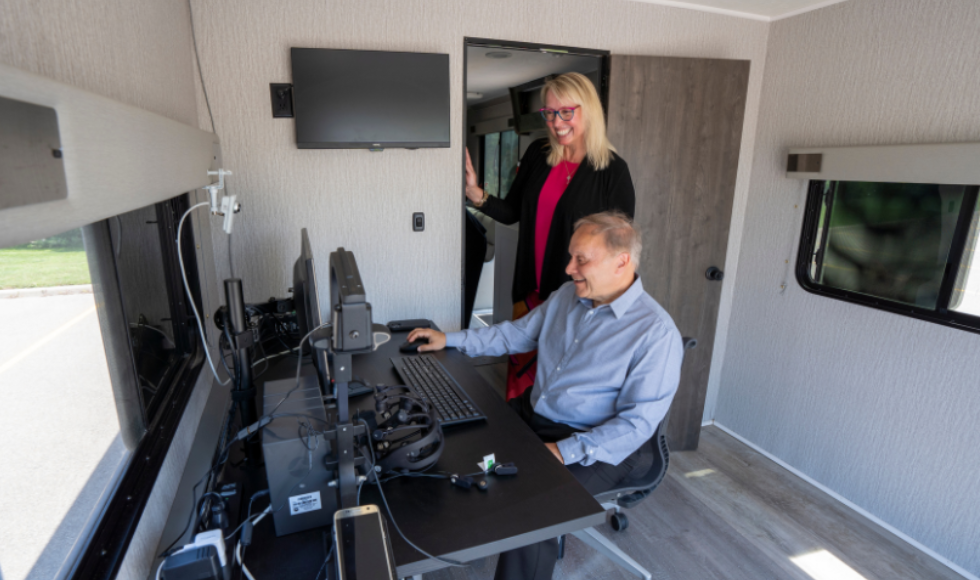MIRA funds two research projects to address older adults’ frailty and the digital divide

The McMaster Institute for Research on Aging is investing more than $2 million across four years to support two interdisciplinary, community-engaged initiatives to improve the lives and mobility of older adults. Milena Head, shown here in the Mobile User Experience Lab, is leading the EMPOWrD project.
BY Amy Ladouceur
June 25, 2024
The McMaster Institute for Research on Aging has launched two major programs of research, committing over $2 million across four years to support interdisciplinary initiatives that address challenges related to older adults’ frailty and mobility.
PACIFIC: A Post-Acute Care Intervention for Frailty using Information and Communication Technology aims to create a robust and responsive support system for older adults transitioning from hospital to home, leveraging community resources and digital tools to facilitate recovery and prevent a return to hospital.
Working with partners and end users, the project aims to co-design a community-based intervention to support people at risk of or living with frailty when they are discharged back to the community.
The interdisciplinary team draws on McMaster researchers from several departments and schools, including Rehabilitation Science, Kinesiology, Health Aging and Society, Medicine, and partners at Hamilton Health Sciences, and the City of Hamilton.
PACIFIC aims to address the question, “Can a combined package of treatments and local programs that are known to work based on evidence make life better for older people with frailty who are going home from hospital?”
“PACIFIC targets a particularly vulnerable population of older adults who are often being discharged back into the community with insufficient support,” says principal investigator Lauren Griffith, a professor in the department of Health, Evidence and Impact.
“This diverse population is not often well represented in research, but our co-design approach amplifies these voices and helps ensure that PACIFIC is as inclusive and accessible as possible to individuals who may be more difficult to reach.”
EMPOWrD: The Enhancing Mobility and Participation for Older Adult Wellness through Digital Inclusion will address the ways in which technology may not reach and enable all populations equally, and how some older adults are left behind.
This gap is deeply widened when lower socioeconomic factors, race, gender and new immigrant status intersect in older adult populations. The EMPOWrD project seeks to enhance mobility and wellness among older Canadians through effective and inclusive technology design.
The team will employ the McMaster Digital Transformation Research Centre (MDTRC) and the new Mobile User Experience Lab (MUXL) vehicle to bring cutting-edge research methods to measure behaviour (such as eye movements, facial emotion reading); physiological indicators (such as electrocardiogram, electromyography, galvanic skin response); and cognitive activities (such as electroencephalography) of users engaged in real-time use of digital platforms and technology.
The MUXL will enable data collection at older adults’ residences and in other community settings, allowing for researchers to reach older adults who often are underrepresented in research.
Driven by researchers from the Faculties of Business, Science, Engineering, Health Sciences, and Social Sciences, EMPOWrD seeks to employ a set of interconnected studies to better understand the ways that older adults experience barriers to access, use, and embracement of technology, and develop methods and best practices for bridging the digital divide to support mobility and well being.
“We are so grateful for the opportunity to explore facilitators and barriers to accessing and continuing to use technology,” notes principal investigator Milena Head, a professor of Information Systems in the DeGroote School of Business.
“There are so many benefits that technology can provide to older adults’ wellness and mobility, but the impact is lost when we design technology that is not age-friendly or when they don’t reach the people who may need the most support.”
Employing cooperative design methods, EMPOWrD will develop user-friendly and accessible technological solutions, while generating design guidelines and standards to accelerate the adoption of support both formal and informal digital engagement.
The project will improve overall mobility and wellness for adults as they age by designing pathways to digital embracement that can directly impact every facet of mobility and wellness, from the physical to the spiritual.
“These new projects address complex questions about aging with a range of perspectives, addressing the digital divide and frailty care with a multifaceted lens and ensuring our impact reaches marginalized older adults,” says Parminder Raina, MIRA scientific director.
“These programs are strengthened by the many perspectives working in tandem to address aging and mobility beyond the physical body.”


